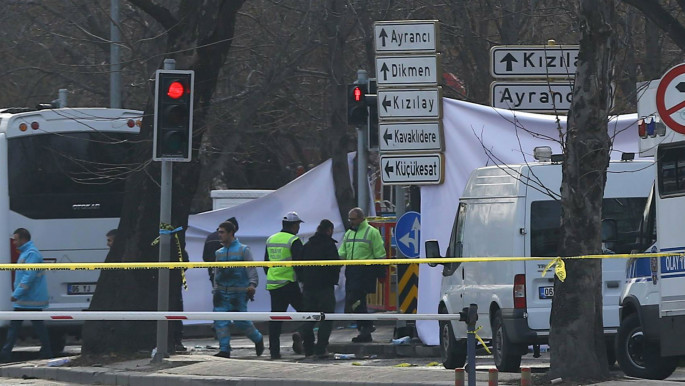Turkey blames Syrian-based Kurds for Ankara bombing
Turkey on Thursday blamed Kurdish militants based inside the country and in Syria for a car bombing targeting a military convoy in Ankara that killed 28 people and added a new escalation to the Syrian conflict.
The massive blast struck five buses carrying military service personnel when they stopped at a traffic light in the centre of the capital on Wednesday evening.
It was the latest in a string of deadly strikes that have rocked Turkey since last summer and one of the deadliest assaults targeting the military in recent years.
Also Thursday, at least six soldiers were killed in an attack on their convoy in the Diyarbakir region of south-eastern Turkey blamed on Kurdish militants, security sources said.
Prime Minister Ahmet Davutoglu and President Recep Tayyip Erdogan both said the Ankara attack was a joint operation of the outlawed Kurdistan Workers' Party [PKK] in cooperation with the Syrian Kurdish People's Protection Units [YPG].
"It has with certainty been revealed that this attack was carried out by members of the terrorist organisation in Turkey in cooperation with a YPG member who infiltrated from Syria," Davutoglu told reporters.
He said the bomber was a Syrian national named Saleh Najjar.
Davutoglu warned Russia - whom Turkey accuses of actively backing the YPG in Syria's civil war - that Moscow would be "held responsible" if such attacks continued.
Erdogan said 14 people had been detained in nationwide raids over the Ankara bombing.
'Convince our allies'
The attack struck the heart of power in the Turkish capital in an area where the headquarters of the army, the parliament and prime minister's offices are in close proximity.
 |
|
| The Ankara blast killed 28 people [Getty] |
Pictures showed at least two of the vehicles reduced to burnt-out wrecks, and the massive blast was heard from all over the city, causing panic among locals.
Ankara was already on alert after 103 people were killed on October 10 in a double suicide bombing blamed on Islamic state group [IS] militants.
Davutoglu said 27 of the dead were military staff and one was a journalist, reports have said.
Eighty-one people were wounded, seven of whom are still in intensive care, the health ministry said.
Hours after the attack, Turkey's air force launched new strikes on PKK targets in northern Iraq, acting on intelligence that there were dozens of fighters including top rebel leaders in the area.
The YPG and its political wing the Democratic Union Party [PYD] deny being PKK branches and argue they have no interest in attacking Turkey.
PYD head Saleh Muslim rejected any responsibility for the Ankara blast, saying the group had "never heard of this person Saleh Najjar".
Turkey considers both the PKK and YPG to be terror groups, in a rare rift with the United States, which only classifies the PKK as a terrorist outfit and works closely with the YPG as an effective force fighting IS jihadists in Syria.
"This process will help our friends - who we could not convince so far - better understand how strong the links are between the PYD and YPG in northern Syria with the PKK in Turkey," said Erdogan.
Turkey has in the last months waged an all-out assault on the PKK, which launched an insurgency against the Turkish state in 1984, fighting for greater autonomy and rights for the country's largest ethnic minority.
In a bid to up the diplomatic pressure on world powers to condemn the YPG, ambassadors from the five permanent UN Security Council members plus Germany were invited to the foreign ministry for a briefing on the bombing.
'Fighters cross to Syria'
Turkey fears the Syrian Kurds want to carve out an autonomous region across the border in northern Syria stretching from the Iraqi border almost to the Mediterranean.
Ankara is concerned the Kurds will now take a "corridor" east of the flashpoint Syrian border town of Azaz - currently still in rebel control - to link up two Kurdish-held areas.
At least 500 rebels on Wednesday crossed the Turkish border heading for Azaz.
Turkish artillery late Thursday struck YPG positions in northern Syria.
The shelling was the heaviest in recent days and had killed two civilians and wounded 28 others.
Turkey has for six consecutive days shelled Syrian Kurdish targets inside Syria, saying the military was responding to incoming fire.



